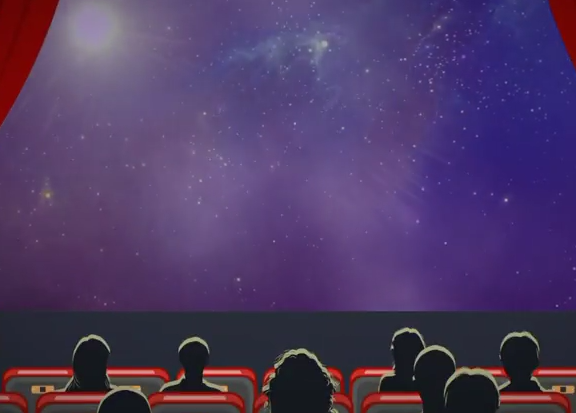In 1957, an advertising executive from New Jersey announced that
1957年,新泽西州的一位广告主管宣布
he had convinced moviegoers at a local theater to buy more popcorn using subliminal messaging.
他通过使用潜意识信息说服了当地影院的观众购买更多的爆米花。
He claimed that 45,000 moviegoers were exposed to flashes of the words "Eat Popcorn" and "Drink Coca-Cola" on screen during a movie,
他声称,4.5万名观众在一部电影的屏幕上看到了“吃爆米花”和“喝可口可乐”这两个闪动的词,
with the words appearing and disappearing so quickly that viewers weren't even aware they were there.
这两个词非常快速地出现消失,以至于观众都没注意到它们的存在。
And as a result, popcorn sales increased an average of 57.5% and Coke sales increased 18.1%.
最终,爆米花销量平均增长了57.5%,可乐销量增长了18.1%。
He got a lot of attention for this supposedly-scientific test, because those numbers are huge.
他因这个假想的科学测试得到了很多关注,因为这些销量数字巨大。
It was every advertiser's perfect fantasy and every consumer's worst nightmare.
它是每个广告商的完美幻想,也是每个消费者的噩梦。
The idea that we could be constantly influenced by messages we don't even realize we're getting freaked people out.
我们可能经常受到自己没留意接收的信息的影响,这一观点把人们吓坏了。
Except … the whole thing was a hoax.
不过,整件事只是个恶作剧。
It turned out that there hadn't been an increase in popcorn or Coke sales at the theater in question.
事实证明,影院里的爆米花和可乐销量并没有增加。
And according to the theater manager, there hadn't been an experiment at all.
而且根据剧院经理的说法,这里根本没有做过实验。
But that hasn't stopped us from believing in the power of subliminal messages.
但这并没有阻止我们相信潜意识信息的力量。

Surveys from 1983, 1994, and 2004 show that
1983年、1994年和2004年的调查显示,
about three-quarters of people who are familiar with subliminal messaging believe that companies use it
大约四分之三熟悉潜意识信息的人相信很多公司会利用它,
and a majority of those people think that it works.
而且他们大多数人认为它有作用。
Thankfully, research doesn't agree.
幸运的是,研究人员不同意这个观点。
Subliminal perception is for sure a thing.
阈下知觉肯定存在。
We definitely can react to a stimulus even when we can't consciously perceive it.
我们肯定能对刺激做出反应,即使我们意识不到它。
Which is different from superliminal perception,
它与我们的超阈知觉不同,
things that we do consciously perceive, even if we don't pay direct attention to them, like product placement.
即使我们不直接关注某些东西,但仍会有意识得感知它们,比如产品植入。
The line in between those two is known as the subjective threshold.
这两者之间的界限被称为主观阈限。
Then, below that, there's the objective threshold, the level at which we don't perceive or react to the thing.
然后在它下面还有一个客观阈限,在这个水平上,我们无法感知事物或对它做出反应。
Subliminal perception research dates back to a book published in 1898,
阈下知觉研究可以追溯到1898年出版的一本书,
when a psychologist was looking to confirm the idea of a so-called "sub-waking self."
当时一位心理学家试图确认所谓的“潜意识自我”概念。
In a few experiments, he asked about two dozen participants to read numbers or letters on cards.
在一些实验中,他要求20多名参与者阅读卡片上的数字或字母。
But he held the cards so far away that they could only see a blur or small dot.
但他把卡片拿得很远,以至于参与者只能看到一个污迹或一个小点。
When forced to choose, participants could usually distinguish between numbers and letters,
当参与者被迫选择时,他们通常可以区分数字和字母,
they got it right around two-thirds of the time.
当时他们答对了三分之二左右。
And they actually did better than chance at guessing exactly what was on each card.
他们实际比碰巧猜中每张卡片上的内容做得更好。
All of which suggested that they were perceiving the images on some level,
所有这些都表明他们在某种程度上可以感知图像,
even though they thought they were just guessing.
尽管他们认为这只是猜测。
A 1951 study in the journal Psychological Review found
1951年发表在《心理学评论》杂志上的一项研究发现,
even clearer evidence by conditioning people to associate certain nonsense words with an electric shock.
通过让人们适应将某些无意义的词语与电击联系起来,迹象更明显。
Later, when the words were shown to them too briefly to be consciously seen,
研究人员随后快速向人们展示了这些词语,让他们无暇有意识地看清楚,
the researchers measured greater electrodermal activity for words associated with the shock.
测出了与电击有关的词汇会导致他们的皮肤电反应更强烈。
That's a slight change in how well skin conducts electricity, which is associated with sweating.
这是皮肤传导电流的细微变化,它与出汗有关。
In other words, even though subjects believed they hadn't seen anything, their bodies still anticipated the jolt.
换句话说,即使实验对象认为他们什么都没看见,他们的身体仍有预期的震动。
So, we know subliminal perception is real.
所以,我们知道阈下知觉是真实存在的。
But subliminal advertising doesn't really work.
但是潜意识广告并没有真正起作用。
Researchers have done plenty of studies,
研究人员做了很多研究,
but no one seems to be able to show any real change in consumer behavior in response to subliminal ads.
但是似乎没有一个能够证明消费者对潜意识广告的反应有任何真正的变化。
For instance, a 1975 study in the journal Perceptual and Motor Skills flashed the words "Hershey's Chocolate" over a movie.
例如,1975年发表在《知觉与运动技能》(perception and Motor Skills)杂志上的一项研究在一部电影中闪现“好时巧克力”(Hershey's Chocolate)字样。
But the researchers found that none of the 33 subjects given the message
但研究人员发现,33名受试者中没有一个人受到信息影响,
bought Hershey's in the ten days after the exposure.
在看到“好时”的广告十天内购买它。
There's one exception, though.
不过有个例外。
A subliminal message can sort of work, but only if you're already motivated to follow it.
潜意识信息可以起到一定作用,但前提是你已经有动力去遵循它了。
A 2002 study of 81 undergraduates found that
2002年一项针对81名大学生的研究发现,
they did drink more water when subliminally primed with words like "dry" and "thirsty"
当他们下意识地被“干”和“渴”这样的词进行暗示时,他们确实会喝更多的水
but if and only if they were already thirsty.
但唯一的前提是他们已经渴了。
If they weren't, the hidden messages didn't do anything.
如果他们不渴,那么隐藏的信息没有任何作用。
In a follow-up experiment in the same study,
在同一研究的后续实验中,
35 undergraduates were asked to pick between sports drinks described as "thirst-quenching" or "electrolyte-restoring".
35名大学生被要求在被描述为“解渴”或“恢复电解质”的运动饮料中进行选择。
They were only more likely to prefer the "thirst-quenching" drink
他们可能更喜欢“解渴”的饮料,
if they were subliminally primed with thirst-related words and were already thirsty.
如果他们潜意识被与口渴相关的词汇所刺激,并且已经渴了的话。
So subliminal messages aren't going to make you do things you don't want to,
所以潜意识信息不会让你做不想做的事,
but they might nudge you gently in a direction you're already headed.
但它们可能会轻轻地把你推向你已经前往的方向。
It makes sense that subliminal messaging wouldn't drastically impact your behavior.
潜意识信息不会对你的行为产生巨大影响,这是有道理的。
The message is so subtle that it only has a subtle effect.
信息如此渺小,以至于它的影响也很微小。
Which is good, because subliminal advertising isn't technically illegal in the U.S.
这是好事,因为潜意识广告在美国并不是非法的
While Australia and the U.K. have laws against it, the U.S. doesn't forbid advertisers or networks from using it.
虽然澳大利亚和英国有法律禁止,但美国并没有禁止广告商或网络使用它。
That said, a 1979 Supreme Court case ruled that it isn't protected by the First Amendment.
也就是说,1979年最高法院判例规定它不受第一修正案的保护。
And the Federal Communications Commission's official stance is that it's misleading and shouldn't be used
而联邦通信委员会的官方立场是,它具有误导性,不应该被使用。
and they reserve the right to yank the broadcasting license of anyone who does.
而且他们保留剥夺任何人广播执照的权利。
So nobody likes subliminal advertising; there just hasn't been that much effort put into stopping it.
没有人喜欢潜意识广告,只是没有太多的努力去阻止它。
Probably because in the end, it isn't that useful.
这可能是因为最终它没有那么有用。
Advertisers don't really care about sneakily targeting people who are already motivated to buy their stuff,
广告商并不真的关心那些已经有动机购买他们产品的人,
they'd rather invest in snagging new customers.
他们宁愿投资争取新客户。
Thanks for watching this episode of SciShow Psych.
感谢您收看本期的心理科学秀。
If you want to learn about ways your mind can actually be hacked into buying things,
如果你想知道你的大脑是如何被购买欲侵入的,
check out our episode on how restaurants trick you into spending.
请查看我们那期“餐馆如何诱导你消费”。












